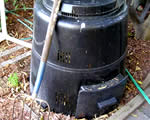 Go to main content
Go to main content
Archive Website of the UK government
Please note that this website has a UK government accesskeys system.
Main menu
Page menu
Environment and greener living

Composting

Composting turns waste into nutrients for your garden and can help reduce climate change. You don't need a big garden to make your own compost. Most garden weeds, and uncooked vegetable and fruit peelings can be composted. Many local councils sell cheaper compost bins. Get advice from the RecycleNow website.
Why composting is important
More than a third of household rubbish is food or garden waste and most of this ends up in landfill. When green and food waste breaks down in landfill, it can give off methane, a gas that has a big effect on climate change. When green waste is properly composted at home, it doesn't give off methane. This means that composting can help reduce climate change as well as provide free food for your soil.
Mixing compost into soil will have many benefits, like providing nutrients that help plants grow and helping the soil hold on to moisture. It can even help slow down weed growth. If you make your own compost, it can help you avoid peat-based composts. Extracting peat to make compost damages wildlife and adds to climate change.
Many households in the UK compost their green and food waste, and this number is growing.
Make your own compost
Many councils sell home compost bins, often at a reduced price. You can also buy compost bins and smaller Green Cone and Bokashi bins from retailers like local garden centres and DIY stores.
For advice about home composting, visit the RecycleNow website or telephone the home compost helpline on: 0845 600 0323.
What you can and can't compost

The number of people who make their own compost is growing fast
In your garden you can compost:
- fruit and vegetable peelings
- tea bags and coffee grounds
- crushed egg shells
- grass cuttings, prunings, old bedding plants and hedge trimmings
- scrunched or shredded paper and some kinds of cardboard
- animal hair
- vacuum dust (only from woollen carpets)
- garden and pond plants
In your garden you shouldn't compost:
- cat or dog excrement
- meat and fish
- dairy products
- diseased plants
- disposable nappies
- shiny card
- hard objects
Make your own worm farm
Another way of making compost is to make or buy a wormery. Building your own worm farm will help reduce your household food waste. It produces beneficial worm compost (‘vermicompost’) and liquid feed for your garden or allotment.
Worms will easily turn your cardboard, food scraps and garden waste into rich compost, though they do not like citrus peelings or large bones or chunks of meat and fish. They will also happily compost natural materials such as hair, wool, and eggshells.
Home collection for garden and food waste
Many local authorities and community organisations will collect waste from your home for composting.
Garden waste collections
Some councils may be able to offer a collection of garden waste from your home. Many councils compost this waste and sell it for use at home. Green waste collections are often free but some councils charge a small fee.
The link below asks you for your postcode. It then takes you to the pages on your local council website that deal with disposing of garden waste.
Food waste collections
Your local authority, or a community scheme, may collect food waste from your home and take it away for composting or anaerobic digestion. Schemes that compost kitchen waste must be approved to handle food and kitchen waste by the State Veterinary Service, under the 'Animal By-Products Regulations'.
The link below will take you to your local council website where you can find out more.
Taking garden waste to a recycling centre
You can also take garden waste to your local household waste and recycling centre (civic amenity site). You will find skips for garden waste that will be composted, and the compost sold or used locally.
Your council looks after local waste and recycling centres and can advise you on opening times and locations.
Community composting
Contact an organisation like the Community Composting Network to get involved in projects that encourage people to compost.
Composting pond plants
Some pond and water plants can cause a lot of damage to other plants and animals. For example, the floating pennywort can grow 20 centimetres a day, blocking out light and reducing the oxygen for other plants and animals.
You can compost pond plants or put them in your council’s garden waste collection bin. Don’t dump plants in the wild as they could get into ponds or streams and start spreading.
Find out how to stop the spread of aquatic plants on the ‘Be plant wise’ page.
Animals and kitchen waste
Generally, keeping domestic pets doesn't prevent you using composted kitchen waste in the garden.
However, some animals mustn’t be allowed near food waste because they could catch diseases from it. If you keep any of the following animals, you mustn’t compost on the premises:
- pigs
- cattle
- sheep
- goats
- deer
- other hoofed animals
If you keep poultry, you must compost using an enclosed container so that the poultry doesn’t come into contact with it.
 Facebook
Facebook Twitter
Twitter StumbleUpon
StumbleUpon Delicious
Delicious Reddit
Reddit
